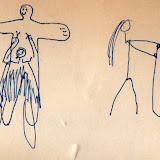 I grew up in Southern California. Current statistics show that the majority of inhabitants in this part of the world speak Spanish before they speak English. In high school, all students are required to take some form of language learning and I chose Spanish being the practical minded person that I was. However, I treated Spanish with the same sort of attention I have been giving my latest cycling injury, couldn’t care less. My worst grades were in Spanish. I can remember Mrs. Contreras calling on me always right when I was in the middle of goofing off with Matt Comeux, and I would always respond with a barely intelligible combination of badly ordered pronouns and horribly conjugated verbs. In university I avoided further Spanish training by taking a multi-cultural class which taught me all sorts about seven different religions, but no language. But then 18 months ago I decided that it was absolutely critical for me to learn a new language to move forward on my quest of becoming a renaissance man.
I grew up in Southern California. Current statistics show that the majority of inhabitants in this part of the world speak Spanish before they speak English. In high school, all students are required to take some form of language learning and I chose Spanish being the practical minded person that I was. However, I treated Spanish with the same sort of attention I have been giving my latest cycling injury, couldn’t care less. My worst grades were in Spanish. I can remember Mrs. Contreras calling on me always right when I was in the middle of goofing off with Matt Comeux, and I would always respond with a barely intelligible combination of badly ordered pronouns and horribly conjugated verbs. In university I avoided further Spanish training by taking a multi-cultural class which taught me all sorts about seven different religions, but no language. But then 18 months ago I decided that it was absolutely critical for me to learn a new language to move forward on my quest of becoming a renaissance man.
I am always very impressed when I run into people that have mastered six languages and they can interchange between them all in a group of people all speaking each of the languages and they can sip a beer at the same time. Co-author Charles is pretty good with this although maybe not to that extreme. I think he has shared his thoughts already on learning Turkish. I can learn a programming language or technology in only a few hours so how hard can it be to learn a foreign language? Well I think to get to the point where you think in another language and are not translating in your head, it is very hard despite what these few freaks of nature might tell you. In Norway, most citizens can speak at least three languages but they begin that effort at a young age right before they are all taught to bake bread and milk cows. In addition, no one else speaks Norwegian, minus the Scandic countries, so they better join the global community with fervour. So how do you compensate for a late start?
Move somewhere that speaks the language you want to learn. I chose Argentina. Turns out Argentines speak an interesting version of Spanish, Castellano. That word in itself is only said properly by the Argentines due to the ‘SJA’ sound made with the double L combination. I have been chided by other Spanish speakers for my Argentine accent but what I have realized is that every Spanish group has a very distinct dialect. Now, most English people think that all Americans speak the most uneducated deep south accent that America has to offer, which is so ignorantly untrue. Although America has many accents, I do not feel that we display a large variety. On the other hand, within the tiny confines of England, I frequently have to ask people to repeat themselves over and over to understand what they said. “I thought I spoke English” is what I tell them after I give up on understanding and just nod my head and smile. Amongst the Spanish speaking world, their are enormous variations. Chileans talk fast, Argentines talk somewhat like gay Italians, the Spanish are still at war with each other trying to decide what language is the Spanish national language, Mexico truly does sound like someone having a siesta, the farm lands in Argentina shared their language with their animals, and so on. What does this all mean? My Spanish is turning into the biggest cock up of accents I can imagine, but I like that, I take pride in that.
So how did I get on with my learning effort? Not bad, but much more to go. I took one month straight of classes in Buenos Aires. Five days a week, four hours a day. Fantastic but expensive even by South American standards and I opted to spend my money on cycling trips, buses to Chile, flights to Brazil and Patagonia, and several whole cows I ate at my leisure. However, I can interact with people in Spanish even if it is in a way that makes some people look straight into my eyes with the most blank look ever on their face, but then they snap out of it and then respond to what I said since I got the point across. Like telling people that ice cream is cream of ice or saying a homeless person is a man without a house in a very literal way.
This makes me think of the infamous Johan. Swedish national who moves to California in his early 30’s to find life and happiness. In a few weeks, he got himself a social security number, a drivers license, a gym membership, several bank accounts, season passes to every rave in Los Angeles, a car, and much more. His English was flawless, with an accent, but it did have some peculiarities. It became obvious to me with only one example that might be hard to appreciate in writing but it went something like this… I told Johan something that was true but slightly hard to believe. A normal English language response would be something like “Ahhhh get outta here.” Johan looks straight in my eyes and says “Ahhhh fuck you.” He meant the same thing, but I stared blankly at him and was not sure what to say next. I frequently was the Johan of South America.
Some things that stand out from my efforts of learning a language.
The modern day genius Andrew Hunt has this theory that you only need thirty words to operate in any language. At least operate to the point that you can get what you want and go where you want. I watched him do this in Portuguese and Spanish quite succesfully. What would your thirty words be? It’s a travelers solution but it can be effective.
Pictionary is an absolutely fantastic game. Below you can find some pictures that I saved from a very hilarious game that transcended any and all language barriers and probably broke down a few moral ones at the same time.
Saying jokes you have learned in English do not always convey the same hilarity as you may think. The go to joke I blogged about recently is a eprfect example since they do not use the expression “Now your fucked!”
Some people can communicate very well regardless of language. you will need the basics of the language of course but you would be surprised to what extent you can understand somebodies heart, mind, and soul when you are forced to describe some of your deepest emotions in a second language and understand theirs at the same time. And when you realize that you both understand completely, it can be a magical thing. Give it a try.
Much easier to speak Spanish when you are drunk.
So now what? I need to be better. Initially my goal was to be able to tell jokes or at least make people laugh. I can do that, even though they might be laughing at me, whatever. Now I want to listen to the radio and understand more than 40% of the words. I want to watch TV and understand more than 60% of the words. I want to barge into conversations with a complete change of topic and demand respect without batting an eyelid. I want to jump behind a bar and act like I am working it, then jump back over and use the money I had just received for my efforts, and buy a beer. So I have signed up for two advanced classes here in England for the next 3+ months and regularly chat and talk with people in Spanish online. In four months I will be back in South America to taste those empenadas and see if the language can hold up.





